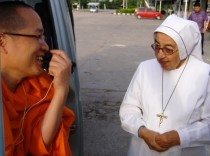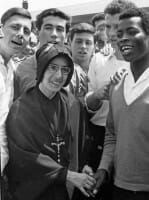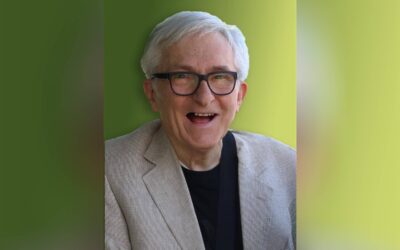 Several Buddhist monks that visited the focolare regularly also knew her well. Benedetta was a woman who let herself be approached and known, without fear and with gentleness. She knew how to welcome people and you could go to her any time. Any problem, great or small, any need, some good news to share: she wasn’t scandalised by anything, she knew people’s hearts and knew how to love them. One bishop once said of Sister Benedetta that she was “a Sister of silver and gold” because of all the money she was able to find for the poor. When visiting the extreme north of Thailand, you were always obliged to go and ‘have a chat’ with her, as she would say. She enjoyed hearing the news of her ‘great family’ as she loved to call the Movement, and she shared its life with many others. We would often meet people in the Mariapolis to whom she had spoken about the spirituality of unity, or else someone who had passed by the focolare to meet us because they had heard Sister Bene talk about us. In other words, Benedetta was a true spiritual mother who gave much supernatural life to so many people, and many of them attended her funeral along with a large crowd of bishops, priests and laity. The small church of Wien Pa Pao and the adjoining convent where she lived were filled to overflowing.
Several Buddhist monks that visited the focolare regularly also knew her well. Benedetta was a woman who let herself be approached and known, without fear and with gentleness. She knew how to welcome people and you could go to her any time. Any problem, great or small, any need, some good news to share: she wasn’t scandalised by anything, she knew people’s hearts and knew how to love them. One bishop once said of Sister Benedetta that she was “a Sister of silver and gold” because of all the money she was able to find for the poor. When visiting the extreme north of Thailand, you were always obliged to go and ‘have a chat’ with her, as she would say. She enjoyed hearing the news of her ‘great family’ as she loved to call the Movement, and she shared its life with many others. We would often meet people in the Mariapolis to whom she had spoken about the spirituality of unity, or else someone who had passed by the focolare to meet us because they had heard Sister Bene talk about us. In other words, Benedetta was a true spiritual mother who gave much supernatural life to so many people, and many of them attended her funeral along with a large crowd of bishops, priests and laity. The small church of Wien Pa Pao and the adjoining convent where she lived were filled to overflowing.  Sr Bene, of the Sisters of Charity of the Infant Mary, known to the secular world as Benedetta Carnovali, born in 1925, was a pillar of the Movement and many of the people who belong to the Focolare community of Thailand were personally drawn to the Movement by her (including Buddhists). ‘A real Sister and a true focolarina,’ as she was described by some: an ‘out-of-the-ordinary’ Sister, always on the go and, at the same time, ‘firm’ when personally loving the person next to her. She was a friend who would call you up to wish you a happy birthday, even though her voice became feebler every year, but not her interior strength. Whenever you approached her you were never given the impression that you had disturbed her: it was as if she had been expecting you alone and didn’t have anything else to do but welcome you. But she was quite busy, judging from all the adoptions at a distance which she personally saw to, up until the last days of her life. Sister Bene had met the Focolare’s spirituality of unity from an order priest in 1963, and from that moment spent her life that many in Myanmar – where she was living in that period and then in Thailand when all Religious were expelled by the regime – could know the spirituality and live it. When she was transferred to Thailand, she continued to deepen her friendship with the Focolare. When she went to spend a few days at the focolare, she nourished herself on the words of Chiara Lubich. Like all those who genuinely follow God, Sister Benedetta also encountered her nights, ‘the storm’ as she followed Jesus. She faced them as a true disciple of Jesus, with heroic charity. Deeply united with Vale Ronchetti, one of the first focolarine, she pressed on in the midst of much miscomprehension: ‘How can a nun belong to a movement with so many lay people in it?’ she was often asked; and there were other great and small persecutions that on a human level were completely absurd. Yet, in some mysterious way, God made use of these things to make Sister Benedetta more and more a Sister, more and more a spiritual daughter of Chiara (as Benedetta often said), and an apostle of unity who has no counterpart in the Asian southeast judging from the fruits she bore. She leaves a legacy of love, gentleness, sweetness and strength, loving service to the least: towards the people of the Akha tribe, for example. She leaves us withthat smile so typical of those who have experienced that it is possible to transform suffering in Love and make that Love their reason for living. Sister Benedetta ‘flew” to Heaven at the age of ninety, after listening to the Focolare song that she loved: ‘Solo grazie’. She died consumed but serene, just as she had always lived: in peace because she was certain that the ‘arms’ that had embraced her from her childhood (she was an orphan) and carried her through her life as a Religious, were there waiting for her now on this last stretch of her journey. She was a wonderful woman who shows that it is still possible to become a saint today. Luigi Butori
Sr Bene, of the Sisters of Charity of the Infant Mary, known to the secular world as Benedetta Carnovali, born in 1925, was a pillar of the Movement and many of the people who belong to the Focolare community of Thailand were personally drawn to the Movement by her (including Buddhists). ‘A real Sister and a true focolarina,’ as she was described by some: an ‘out-of-the-ordinary’ Sister, always on the go and, at the same time, ‘firm’ when personally loving the person next to her. She was a friend who would call you up to wish you a happy birthday, even though her voice became feebler every year, but not her interior strength. Whenever you approached her you were never given the impression that you had disturbed her: it was as if she had been expecting you alone and didn’t have anything else to do but welcome you. But she was quite busy, judging from all the adoptions at a distance which she personally saw to, up until the last days of her life. Sister Bene had met the Focolare’s spirituality of unity from an order priest in 1963, and from that moment spent her life that many in Myanmar – where she was living in that period and then in Thailand when all Religious were expelled by the regime – could know the spirituality and live it. When she was transferred to Thailand, she continued to deepen her friendship with the Focolare. When she went to spend a few days at the focolare, she nourished herself on the words of Chiara Lubich. Like all those who genuinely follow God, Sister Benedetta also encountered her nights, ‘the storm’ as she followed Jesus. She faced them as a true disciple of Jesus, with heroic charity. Deeply united with Vale Ronchetti, one of the first focolarine, she pressed on in the midst of much miscomprehension: ‘How can a nun belong to a movement with so many lay people in it?’ she was often asked; and there were other great and small persecutions that on a human level were completely absurd. Yet, in some mysterious way, God made use of these things to make Sister Benedetta more and more a Sister, more and more a spiritual daughter of Chiara (as Benedetta often said), and an apostle of unity who has no counterpart in the Asian southeast judging from the fruits she bore. She leaves a legacy of love, gentleness, sweetness and strength, loving service to the least: towards the people of the Akha tribe, for example. She leaves us withthat smile so typical of those who have experienced that it is possible to transform suffering in Love and make that Love their reason for living. Sister Benedetta ‘flew” to Heaven at the age of ninety, after listening to the Focolare song that she loved: ‘Solo grazie’. She died consumed but serene, just as she had always lived: in peace because she was certain that the ‘arms’ that had embraced her from her childhood (she was an orphan) and carried her through her life as a Religious, were there waiting for her now on this last stretch of her journey. She was a wonderful woman who shows that it is still possible to become a saint today. Luigi Butori
Place yourself at the service of others
Place yourself at the service of others




0 Comments